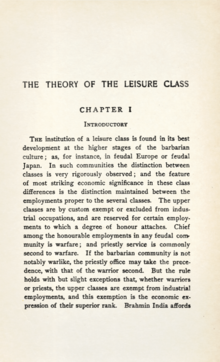托斯丹·范伯伦
外观

托斯丹·邦德·范伯伦(英语:Thorstein Bunde Veblen,挪威语:Torsten Bunde Veblen,1857年7月30日—1929年8月3日),又译为托斯丹·凡勃伦,生于美国威斯康辛州卡托(Cato),挪威裔美国人,经济学家,被推崇为制度经济学的创始者。著名作品为1899年出版的《有闲阶级论》及1904年出版的《企业理论》(The Theory of Business Enterprise)。
略年谱
[编辑]- 1857年生于威斯康辛州的挪威移民家庭,是移民第二代家庭里的第六个小孩;尽管不富裕,但他的家庭强调辛勤工作并注重教育。范伯伦在5岁前只会说挪威语,之后只透过学校与同学熟稔英语。
- 1865年 - 8岁,迁居明尼苏达州的挪威移民新开垦地。
- 1874年 - 由于父亲希望其成为神职人员而入明尼苏达州卡尔顿学院,师从经济学家约翰·贝茨·克拉克。
- 1880年 - 毕业于卡尔顿学院,之后于路德派的学院教授数学一阵子。
- 1881年 - 在查尔斯·桑德斯·皮尔士的指导下入约翰·霍普金斯大学就读研究所。
- 1882年 - 转入耶鲁大学,并研习达尔文与赫伯特·斯宾塞的思想。
- 1884年 - 在耶鲁大学以《因果报应的伦理学基础》(Ethical Grounds of a Doctrine of Retribution)为题获博士学位。
- 1884年到1891年间,范伯伦一方面由于对移民的歧视,另一方面由于其基督教信仰不深而无法获得教职。这六年间他身居于父亲在爱荷华州的农场,手不释卷持续阅读。
- 1891年 - 入康乃尔大学,在詹姆斯·劳夫林门下修读经济学。
- 1892年 - 随劳夫林至当时新设立的芝加哥大学,成为教学助理(teaching fellow)。
- 1899年 - 出版《有闲阶级论》;范伯伦由于此书中嘲讽生意人的段落而一夕成名。
- 1900年 - 受聘为芝加哥大学助理教授。
- 1904年 - 出版《企业理论》(The Theory of Business Enterprise)。
- 1906年 - 离开芝加哥大学并转入斯坦福大学,成为副教授。
- 1910年 - 离开斯坦福大学并转入密苏里大学。
- 1914年 - 第一次世界大战结束后访问挪威,隔年完成《德意志帝国与产业革命》(Imperial Germany and the Industrial Revolution)。
- 1918年 - 成为纽约杂志The Dial的编辑之一。
- 1919年 - 创建纽约新学院;期间出版《工程师与价格体系》(The Engineers and the Price System),书中认为推翻资本主义者非马克思所说的工人,而是善于发想的工程师们。
- 1927年 - 隐居于加州帕罗奥图的山间小屋。
- 1929年 - 逝于大萧条前,享年72岁。
著作
[编辑]- Theory of the Leisure Class: An Economic Study of Institutions 1899, 1915 edition at Internet Archive
- Theory of Business Enterprise 1904, at Internet Archive
- The Instincts of Worksmanship and the State of the Industrial Arts, 1914.
- Imperial Germany and the Industrial Revolution 1915.
- The Higher Learning In America: A Memorandum On the Conduct of Universities By Business Men 1918, at Internet Archive
- An Inquiry Into The Nature Of Peace And The Terms Of Its Perpetuation pdf 1919, at Internet Archive
- The Vested Interests and the Common Man pdf 1919, on Open Library
- The Engineers and the Price System 1921, at Internet Archive
- Absentee Ownership and Business Enterprise in Recent Times: the case of America, 1923.
- Essays in Our Changing Order, 1927.
